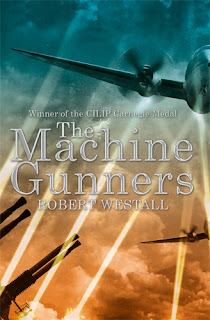Reading this book over the last couple of days has been a joyous and absorbing reading journey. I read the final chapters on the train this morning - hopefully no one saw me crying when I reached chapter 17.
I had a totally wrong impression from the cover of this book. The front of this house looks quite Japanese to my eye but in fact this is a story set in England featuring children evacuated from London and sent to stay with rural families from 1940 onwards. The title comes from a fragment of memory.
"Mum always said her children hung the moon." "you know you've got the right mum when you find one that thinks you hung the moon."
These three children come from a wealthy family. Sadly both of their parents are dead and up until now they have been in the care of an austere grandmother and a series of housekeepers. Their grandmother has now also died and so the three orphans are evacuated to the country. They had no parents in their childhood but they did have a wealth of books and these are mentioned all through the story and then helpfully listed at the back of the book.
In the first home they encounter two brothers who are dreadful bullies. Kate Albus creates so much tension during these scenes. After one dreadful incident the children are sent to a different home with a woman, her three very young children and a baby. Her husband is off fighting in North Africa and she is living in poverty. The family used torn up newspaper in their outdoor toilet. William, Edmund and Anna are cold, hungry and neglected. In one truly awful scene the boys are sent to work with a local farmer - killing rats. (warning this scene will distress sensitive readers).
Finally, after months of worry and neglect the children are taken in by the town librarian. Her library has been their safe haven ever since their arrival. Now they all hope that Mrs Muller might consider letting them all stay - forever! This is the solicitors preposterous plan.
Here are a few text quotes:
The Library - "Inside, the children were greeted by the sort of cool and reverent silence known only to places that house books ... they were home."
Changing the baby - "Removing the pins, she peeled the fetid thing back an inch or two, unwilling to inspect the scene to closely, (she) used the diaper to clean the baby's bottom as best she could ... Hesitating over the writing little body, the children learned a valuable lesson about the importance of speed when diapering a baby. A stream suddenly arced from the exposed infant, hitting Edmund squarely in the chest."
"The children pressed their straw pallets together for warmth but still slept fitfully. In the wee hours of the morning sleeting rain began to pelt the room, and the children awakened to find that all three of their mattresses were damp."
A wartime drama with enough depth and psychological complexity to satisfy budding bookworms. Kirkus
Publisher blurb: It is 1940 and William, 12, Edmund, 11, and Anna, 9, aren't terribly upset by the death of the not-so-grandmotherly grandmother who has taken care of them since their parents died. But the children do need a guardian, and in the dark days of World War II London, those are in short supply, especially if they hope to stay together. Could the mass wartime evacuation of children from London to the countryside be the answer? It's a preposterous plan, but off they go-- keeping their predicament a secret, and hoping to be placed in a temporary home that ends up lasting forever. Moving from one billet to another, the children suffer the cruel trickery of foster brothers, the cold realities of outdoor toilets and the hollowness of empty stomachs. But at least they find comfort in the village lending library-- a cozy shelter from the harshness of everyday life, filled with favorite stories and the quiet company of Nora Müller, the kind librarian. The children wonder if Nora could be the family they've been searching for. . . . But the shadow of the war, and the unknown whereaouts of Nora's German husband complicate matters.
Awards:
- An ALSC Notable Children's Book
- An SCBWI Crystal Kite Award Winner
- A Junior Library Guild Gold Standard Selection
- Named to the Pennsylvania Young Readers Choice List
- A CCBC Choice
You can hear an audio sample here. Here are some discussion questions.
Kate Albus has a new book coming out in September.
Here are some other books that explore the evacuation of children from London during World War II.









































